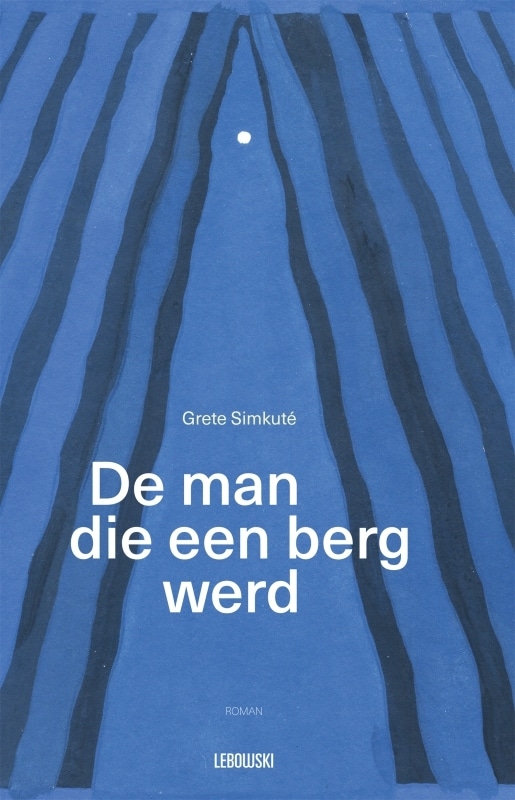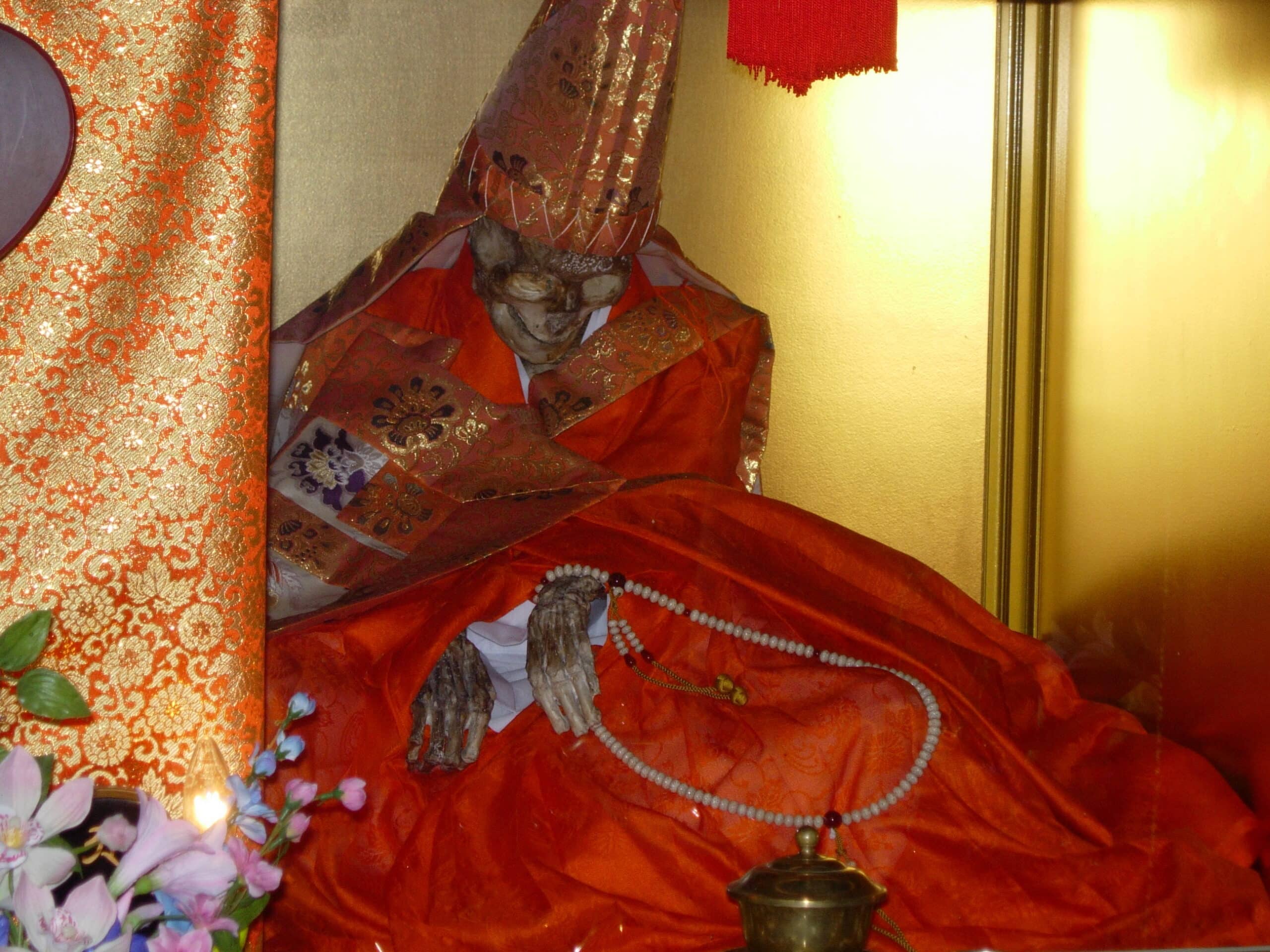‘De man die een berg werd’ by Grete Simkuté: Ultimate Sacrifice in Mysterious Japan
A young woman in search of meaning is inspired by the wanderings of a Japanese monk from the nineteenth century. In De man die een berg werd (The Man Who Became a Mountain), debut author Grete Simkuté writes about human motivations and how they can lead and mislead us.
During a trip to Morocco, a young woman rethinks her relationship with her Norwegian boyfriend. She once fell for his playfulness and nonchalance while travelling through Asia, but nowadays he seems more interested in his surfboard and in gaming on his computer than in her.

While he shows off his skills on the waves of Taghazout on the Atlantic coast with other modern-day hippies, she immerses herself in Haruki Murakami. In due course she falls under the spell of an old Japanese tradition: sokushinbutsu, the practice of monks who isolated, starved, and then self-mummified in sealed mountain caves. Those involved do not call it suicide, but eternal meditation.
The story moves to Japan in the early nineteenth century, the twenties. We meet Myo, a young man who has become a monk in a Buddhist sect. He has just declared to the cult leader that he is ready for sokushinbutsu, the ultimate submission.
Myo’s story is told in two parts. There are the days when he prepares for his final seclusion in the cave, days he spends in near solitude on the sacred mountain near the monastery, surviving on berries he picks from the bushes. Those chapters are interspersed with the story of Myo’s life before he decided to become a sokushinbutsu.
 The mummified body of monk Shinnyokai Shonin
The mummified body of monk Shinnyokai Shonin© Wikipedia
The life story of the young man, still just a teenager, is nothing short of dramatic. He does not speak a word until he is six years old, when he gets a sister. She becomes his heroine. But the family is struggling: the rice crop fails, first father and then mother die of starvation. On her deathbed, Myo promises his mother he will take care of his sister Asa, but during their trek to the city she also dies of hunger. The misery is almost too much for a child’s soul to digest, but luckily, he finds shelter in the monastery.
There he can be silent; he no longer has to speak. Some monks see his silence as a sign of strength, others suspect he is carrying a deep secret, still others suspect rage.
It is a book full of reflections on human motivations and how they can lead and mislead us
The setting of the young monk on the mountain, tormented and tested by earthly life, of course means Simkuté has plenty of room to philosophize about life. To say that De man die een berg werd (The Man Who Became a Mountain) is a philosophical novel would be an exaggeration, but it is a book full of reflections on human motivations and how they can lead and mislead us, about the quest for enlightenment, about the desire to be a better person, and our inability truly to know one another. We are nothing but bones, skin, and defeat, is one of Myo’s melancholy observations.
Fortunately, it is not all doom and gloom. There is also time for beautiful dreams, for budding love with an artist, and even for some homoerotic tension with another monk, a man who gets close to Myo through the power of his haiku. Poetry will ultimately play a life-defining role.
And then in the end the question still is: which path do you choose, which mystery do you follow, which sacrifices are you willing to make, for yourself and for others? Simkuté patiently works towards the climax, and the final chapters each get a little more breathtaking, as if in a trance. Eventually you no longer know the difference between the hallucinations and what is real.
 Grete Simkuté
Grete SimkutéSimkuté, who was born in Lithuania and now works in Belgium as an independent journalist and copywriter, has written a very rich first book, full of beautiful images and oriental mysticism. Even though he is inclined towards death, in her story Myo comes alive. Simkuté writes visually and has clearly immersed herself in her subject. She writes with a great sense of rhythm and ambience, and the story is full of poignant observations and remarks about the unbalanced nature of being human, monk or otherwise.
In the end, Simkuté briefly links back to the young woman with the Norwegian surfer boyfriend on just two occasions, because it is clear that Myo’s story also makes her think about her life and particularly her relationship. That this will not endure was already clear from the opening paragraphs. That contemporary framework does not really add much, it is not much more than a reason to read Murakami and discover Japan. The frame story was therefore not absolutely crucial, but that is but a minor flaw in an otherwise excellent debut novel.
An excerpt from ‘De man die een berg werd’, as translated by Elisabeth Salverda
Without saying anything, Katashi started walking; I followed him.
“Maybe you didn’t quite realise this before, but we’re not just any cult.” He stopped and pointed to a pair of swallows gliding low in the sky. “Rain imminent.” We walked woefully. “I see you’re suffering. That’s normal, we all suffer. According to some monks, you can only be released from that suffering after having lived many lives.”
Katashi pointed again, this time at a twisted tree trunk. I glanced at it fleetingly without really seeing it. He continued: “But no, you can attain enlightenment in this life. Buddha’s nature is within, kid. That which is pure, wise, and good. You just have to express it.” I was wondering how to do this, when Katashi added, “You may be wondering how to do that.” A cold wind blew against my legs and I bent down to pull my white socks up a little higher.
“You saw few books in the temple. That’s because everything we need to know can be found here.” At “here,” he opened his palms and looked emphatically around. We had been ascending higher and higher and I noticed it was getting harder to breathe. Where were we? Instead of taking in my surroundings, I had mainly been paying attention to Katashi. “There are three mountains here and they teach us all there is to learn. Three mothers, and we their adopted sons.”
To my relief, Katashi came to a stop in a bare patch of forest. I was done with the walk by now and longed for the warmth of the temple. Panting, I placed my palm against a large, cool rock. “Yeah, kid,” Katashi said after we had stood there for a while. “If you push your body to accept everything nature sets in your path, you also train your mind to receive what Buddha gives you.”
The wind picked up and billowed our kimonos. The two strands of cloth on either side of Katashi’s headband flapped fiercely, whipping him in the face. It became more difficult to understand him. “The gods are restless today,” he cried, laughing, his words ragged through gusts of wind. “Perhaps the dead would like us to honour them with an offering tonight. Some scented oil or frankincense will satisfy them.”
The dead? Perhaps something in my expression changed, it was apparent I wanted to hear more, because Katashi clarified his story. “The mountain is the point of transition between the living and the dead, kid. This is where the boundary is thinnest and we can easily contact the dead.” He said no more, it was time to go back down. With both arms, Katashi clutched his kimono tightly around his body and led the way.
On the journey back I looked around me differently. As though the forest now had something to offer: the dead, Asa. Katashi’s last words had stirred something in me. I could not wait to go back into the woods with him and learn how to find my sister. I would make it clear that for that I would do anything.
Grete Simkuté, De man die een berg werd, Lebowski, 2022, 368 pages












